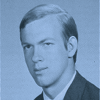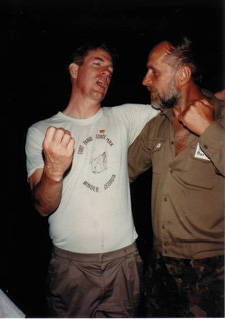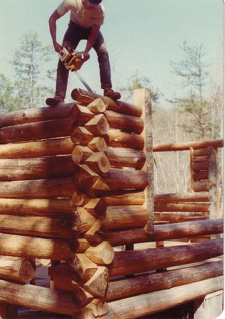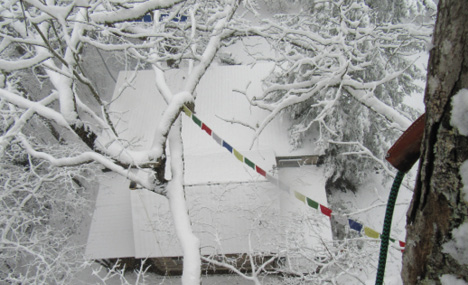James Earl Walker – 50th Reunion Essay
James Earl Walker
 376 Southern Rd.
376 Southern Rd.
Ellijay, GA 30536
perevod@ellijay.com
706-273-3465
Spouse(s): Sandra Perko (1969–1970); Patricia Madsen (1975–present)
Child(ren): Josh (1977); Caleb (1981)
Career: USIA exhibit guide in Baku and Tashkent; fruit tramp, nine years (seasonal); trail construction on various Georgia state parks; Auto Tag service (seasonal); construction of concrete solar wall panels; stone mason; translator, Russian to English, 30 years
Avocations: home construction, hiking, Georgia Forest Watch, tree climbing
College: Branford
A few months after graduation I got a job with the United States Information Agency as an exhibit guide in Baku and Tashkent. After returning to the States, my high-school sweetheart Pat and I decided to get out of the city (Atlanta) and hit the road. Our first stop was Blue Mound, Illinois, to see my good friend and Yale classmate Mike Cottle (now deceased, and dearly missed). While we were there, we received a phone call from Dean Kendall, a Yale dropout. Dean was picking fruit in the Hood River Valley and suggested that we join him. Three days of driving got us there, and we became fruit tramps.
Believe it or not, picking apples was my favorite job ever, and I have had many. We made the trip to Oregon nine times, most years with Mike or Dean, or both, in the orchard with us. Our older son Josh was along for the ride three times, and younger son Caleb once. But taking care of two young kids seriously reduced our picking productivity, and we finally had to give up fruit tramping.
Meanwhile, we had bought some land in the mountains of north Georgia, and we camped out for a year while cutting down and curing poplar logs and building a cabin. Over the years, we’ve added more rooms and conveniences, such as running water after two years, and an indoor toilet after 14 years. No hardship for me, but how many wives do you know who would put up with an outhouse that long?
Two children eventually imposed certain financial needs, and opportunities for decent-paying work in Southern Appalachia were scarce. Returning to the city began to seem inevitable.
Then came the miracle.
My wife and I are Catholic, and at that time the Catholic mission in town consisted of six families in a tiny storefront. Just before Christmas 1984, a new couple showed up at church. The man, Jack, did not look old enough to be retired, so I asked what he did. “I translate Russian scientific journals,” he replied.
“That’s interesting,” I said. “I used to know Russian.”
At that time, I had not spoken or read any Russian for 13 years, but I got out my old Russian grammar book and read it from cover to cover. Jack gave me a few old dictionaries and the address of a publisher. I passed the test and became a translator.
Why would Jack think that some stranger he met at church could possibly translate technical journals? Why would I imagine I could? At first I was constantly afraid that some editor would discover my ignorance of Russian and especially of scientific material. With no feedback, the only indication I had that my work was satisfactory was the checks that kept coming in the mail. In just a few years I began to feel more competent. Thirty years of translation provided a livelihood, thanks to Jack, and kept me in the mountains.
I call it a miracle.

Cross-cultural communication, Przhevalskoe, Russia, 1996

Log cabin construction

Tree climbing, house below
If the above is blank, no 50th reunion essay was submitted.
